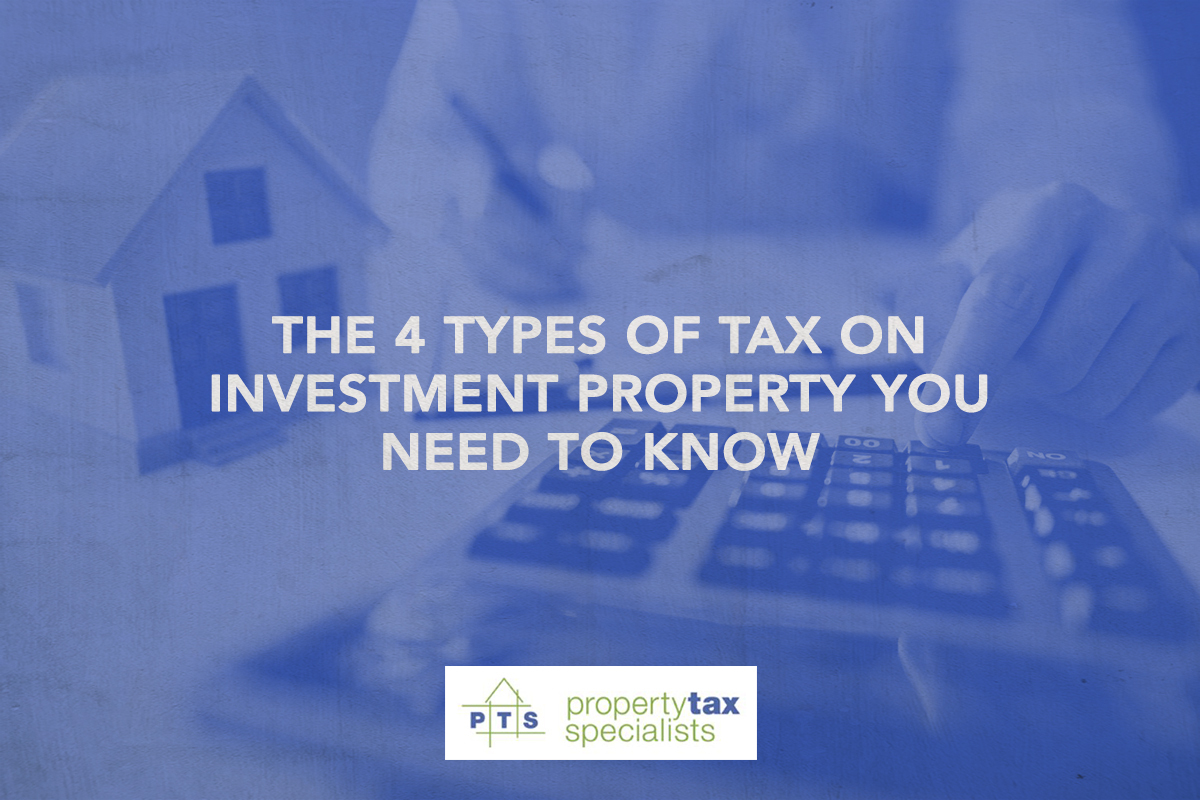The 4 Types of Investment Property Tax You Need to Know
Paying investment property tax is an inevitable part of the investment journey, so it’s worth being prepared on what you’ll be liable to pay.
There are several investment property taxes you’ll have to pay.
So, in this article, we’re going to break down the four types of tax on investment property you need to know, including:
- Stamp duty
- Land tax
- Income tax
- Capital gains tax
1. Stamp Duty Tax on Investment Property
The first investment property tax we’re going to delve into is stamp duty.
Stamp duty is the tax you’ll be liable to pay when your investment property is transferred from the seller to you – that’s why it’s also referred to as transfer duty.
The Australian Tax Office doesn’t allow you to claim stamp duty as a tax deduction, so it’s worth investigating how much you’ll end up paying on the property transfer – especially since it’s a significant acquisition expense.
Example:
Zoe purchases an investment property for $625,000 in New South Wales.
According to the NSW Revenue Office, the following stamp duty currently scale applies, as of July, 2023
|
Property Value |
Rate of Stamp Duty |
| $0 to $16,000 | $1.25 for every $100 (the minimum is $10) |
| $16,000 to $35,000 | $200 plus $1.50 for every $100 over $16,000 |
| $35,000 to $93,000 | $485 plus $1.75 for every $100 over $35,000 |
| $93,000 to $351,000 | $1,500 plus $3.50 for every $100 over $93,000 |
| $351,000 to $1,168,000 | $10,530 plus $4.50 for every $100 over $351,000 |
| Over $1,168,000 | $47,295 plus $5.50 for every $100 over $1,168,000 |
First, Zoe calculates the rate she’ll pay over $351,000:
$625,000 – $351,000 = $274,000
$274,000/ $100 = 2,740
2,740 x $4.50 = $12,330
So, Zoe will pay a stamp duty rate of $10,530 + $12,330 = $22,869
From the example above, you can see that the amount of stamp duty you’ll be liable to pay is dependent on a few different factors, including:
- which state (or territory) you live in;
- how much you’re going to pay to purchase the property (i.e. the property’s value); and
- whether you’re a first-time buyer.
2. Property Investment Land Tax
Unlike stamp duty tax, land tax is not a once-off payment, and it’s payable on the value of the land you own unless that dwelling on that land is your main residence (or primary place of residence).
Each state or territory has its own land tax rate, which is calculated according to the unimproved value of the land.
The unimproved value means that the tax will not consider buildings, paths, landscaping and fences when calculating how much land tax you’ll be liable to pay each year.
Example:
Based on Zoe’s example above, we know she purchased a property worth $625,000. She won’t have to pay land tax on the total value of the property, only the unimproved value of the land.
The Valuer-General determines the value of land and provides notice of valuation to property owners every year. After checking online, Zoe establishes that her property falls below the land tax threshold so she isn’t liable to pay land tax.
However, if her property exceeded the threshold, you would’ve been liable to pay the following rates by December, 31:
| General Threshold | Premium Threshold |
| $100 + 1.6% of the land value above the threshold, up to the premium threshold | $79,396+ 2% of land value above the threshold |
The thresholds for land values change each year:
| Tax Year | General Threshold | Premium Threshold |
| 2023 | $969,000 | $5,925,000 |
| 2022 | $822,000 | $5,026,000 |
| 2021 | $755,000 | $4,616,000 |
| 2020 | $734,000 | $4,488,000 |
| 2019 | $692,000 | $4,231,000 |
Notes: these rates currently applies to NSW in 2023. Please check your relevant state’s or territory’s website for the most updated information.
Like stamp duty, each state and territory has its own land tax rates and land tax thresholds. You can access the relevant land tax rates and essential dates on the Revenue Office websites:
- Queensland;
- Australian Capital Territory;
- Victoria;
- Western Australia;
- Tasmania; and
- South Australia.
Note: The Northern Territory is the only territory (and state) that doesn’t require property investors to pay land tax.
3. Income Tax on Investment Property
As with any income you generate, the income your investment property produces is subject to income tax.
Each year, the income tax on your investment property must be combined with any other personal income you make (such as your salary and other investments) and assessed together in your annual tax return.
If your property is negatively geared (i.e. it’s running at a loss), you can deduct that loss from the income you generate. This will result in a reduced income tax amount. That’s why many investors steer towards negative gearing as an investment strategy rather than positive gearing (where you generate a profit).
Fortunately, the Australian Tax Office (ATO) allows investors to claim several investment property tax deductions, provided that you continue generating a profit from the rental property. These deductions are divided into two categories:
- Immediately deductible rental expenses such as advertising for tenants, council rates, land tax, interest on your mortgage, as well as repairs and maintenance.
- Rental expenses claimable over several years, such as depreciation, which is a deduction you can claim on the general wear and tear of the building as well as its plant and equipment assets.
You can’t claim tax deductions for expenses such as stamp duty, principal loan repayments and costs your tenant paid.
4. Capital Gains Tax (CGT)
If you intend to eventually sell your investment property, there’s a high possibility that you’ll be liable to pay capital gains tax.
According to the ATO, if you make a profit on the sale of your investment property, that profit is considered a capital gain and must be declared on your income tax return.
Once profit on a sale is calculated, it’s then added to your tax return. The additional tax you have to pay resulting from including capital gain on your tax return is known as capital gains tax or CGT.
Fortunately, the ATO does allow property investors to be exempt from paying capital gains tax in certain circumstances.
These exemptions and concessions include the following:
- Main Residence (MR) exemption;
- 6-year absence rule
- Six-month rule
- 50% CGT discount.
How Much Tax Will I Pay on My Investment Property?
Understanding the various taxes associated with investment properties is necessary, but the burning question for many investors is, “how much tax will I pay?” The answer isn’t straightforward, as it depends on several factors:
- Property Value: As seen with stamp duty and land tax, the value of your property can significantly influence the amount of tax you owe. Different states have varying scales and thresholds that determine tax rates.
- Income Generated: The rental income your property produces will be subject to income tax. If your property is negatively geared, you might be able to deduct the loss from your overall income, reducing your tax liability.
- Capital Gains: If you sell your property for a profit, you’ll need to pay capital gains tax. However, the amount can be influenced by various exemptions and concessions, such as the 50% CGT discount or the Main Residence exemption, subject to strict rules.
- Deductions and Exemptions: The Australian Tax Office allows property investors to claim several deductions, which can reduce your overall tax bill. For instance, immediate rental expenses like advertising, council rates, and repairs can be deducted. Additionally, schemes like the First Home Buyer Assistance can exempt you from certain state-based taxes.
To get a precise figure on “how much tax will I pay,” you should consult with a tax specialist. They can provide a tailored assessment based on your property’s specifics and your financial situation.
Key Takeaways
Paying tax on investment property is an inevitable feature of owning property.
However, being equipped with the knowledge of these types of taxes will ensure that you both account for it as well as potentially taking advantage of the various exemptions and deductions made available to you.
Getting the correct tax advice on any of the four types of tax on an investment property could result in saving thousands of dollars.
For example, maybe you didn’t know you could qualify for the First Home Buyer Scheme or that you could extend the main residence CGT exemption.
At Property Tax Specialists, our property experts can help you navigate through all four types of tax on investment property. If you’re still uncertain or wish to seek professional advice on your circumstances, get in touch today!
Disclaimer
Please note that every effort has been made to ensure that the information provided in this guide is accurate. You should note, however, that the information is intended as a guide only, providing an overview of general information available to property buyers and investors. This guide is not intended to be an exhaustive source of information and should not be seen to constitute legal, tax or investment advice. You should, where necessary, seek your own advice for any legal, tax or investment issues raised in your affairs.


